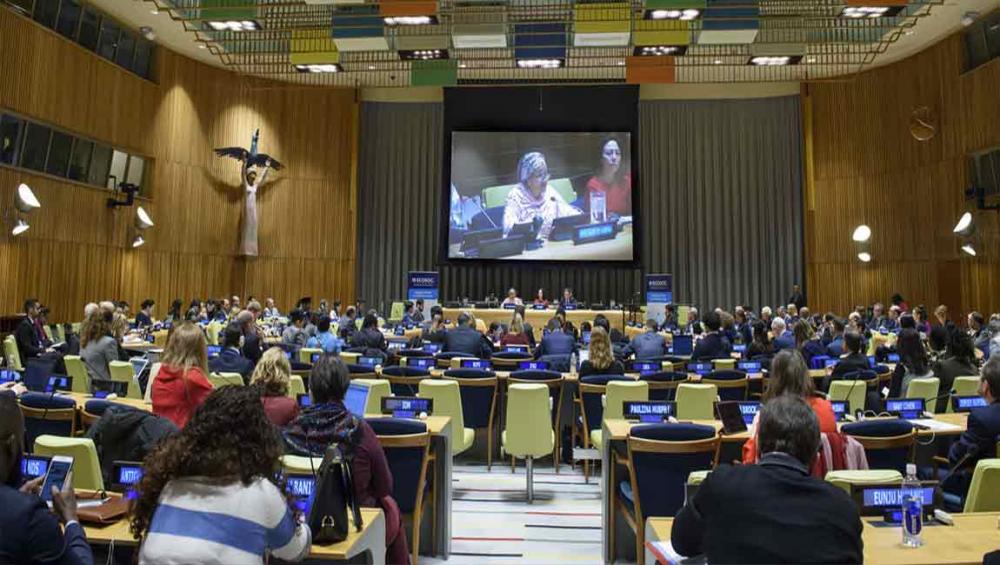Just Earth News | @JustEarthNews | 05 Apr 2018, 10:31 am Print

Loey Felipe
New York: Three years into the 2030 Agenda for Sustainable Development, the United Nations continues brokering new partnerships between governments, the private sector and civil society to achieve the Sustainable Development Goals (SDGs), participants told a forum at UN Headquarters on Wednesday.
“Business as usual approaches won’t work,” said Deputy Secretary-General Amina Mohammed at the 2018 ECOSOC [Economic and Social Council] Partnership Forum, an annual event promoting inclusive societies, including through innovative business models and mobilizing big data for public good.
“We need action – and bold action – to build an inclusive, resilient and sustainable future that leaves no one behind,” she continued.
Mohammed shared a snapshot of today’s world, pointing out that more than eight per cent of the population lives in poverty; 192 million are unemployed; and young people are three times more likely to be jobless.
“Their voices in many places are stifled and leading to a greater sense of disenfranchisement and disillusionment,” she underscored.
Calling the private sector “an indispensable partner,” Mohammed stressed the need to work together “to reduce inequalities, end discrimination, empower people and promote the social, economic and political inclusion of all.”
Partnering with the private sector is essential to pursue common goals and to align their business models with the 2030 Agenda.
“Sustainable business makes business sense,” she continued. “Better engagement with the private sector requires an enabling policy environment and dialogue mechanisms that encourage firms to do business in a way that works for global good, and for the bottom line.”
She said that both the Organization and the private sector need to step up efforts and scale up partnerships to generate results that would “reach the furthest communities and villages.”
“Our ambition is nothing less than ensuring that all human beings can fulfil their potential in dignity and equality and in a healthy environment,” she underscored.
A win-win partnership
Opening the annual forum, Marie Chatardová, ECOSOC President, pointed out that inclusive development models and combatting inequality was critical to achieving the SDGs, which aim to wipe out poverty and boost equality by putting the world on a more sustainable economic, social and environmental path by 2030.
“It also requires building the resilience of societies, communities and people to cope with shocks – be it natural disasters, economic shocks, conflicts or others,” she said. “To do so, we must reach out to ‘those furthest behind first,’ including women, youth, indigenous peoples and persons living with disabilities.”
Citing research by the Business and Sustainable Development Commission, she argued that sustainable business models could unlock economic opportunities “worth up to $12 trillion and increase employment by up to 380 million jobs by 2030.”
“The study also shows the majority of companies are already aware that investing in sustainable development goals is a ‘win-win partnership,’” she stressed.
Chatardová said the private sector can contribute to more inclusive value chains, diversity policies – including marginalized groups in decision-making processes.
“I would also like to take the opportunity to challenge the business leaders present here today to consider making bold commitments to act and invest towards co-designing a more inclusive future for all,” she concluded.
This forum will contribute important elements to a special ECOSOC meeting York in May, which will inform discussions at the High-level Political Forum on Sustainable Development in July 2018.
- Trump signs 10% global tariff, says it takes effect ‘almost immediately’
- BJP wins a seat in Bangladesh — But not the one you think!
- Meet Shabana Mahmood: Could she take over as UK’s first Pakistani-origin Muslim PM?
- Dalai Lama's Office breaks silence on Epstein claims
- Russia says suspect in shooting of GRU Deputy detained in Dubai





-1763561110.jpg)
